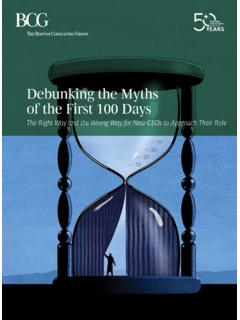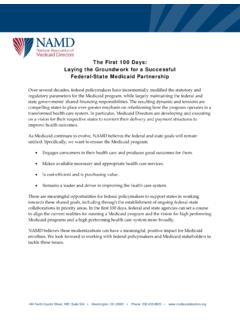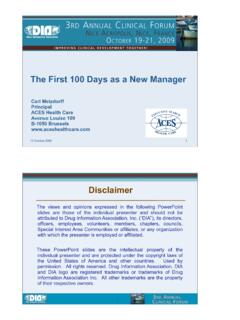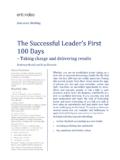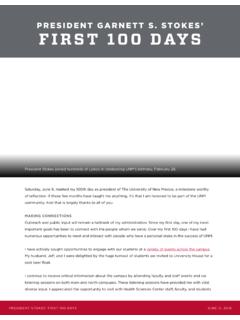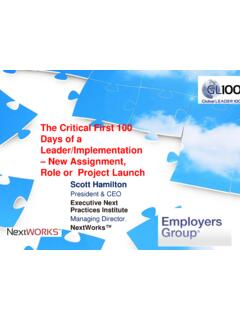Transcription of Your First 100 Days: Laying the Foundation for Executive ...
1 Copyright 2014 DHR International, Inc. All Rights Reserved. Your First 100 days Your First 100 days : Laying the Foundation for Executive Success BY SCOTT SETTE, Executive VICE PRESIDENT, HEALTHCARE PRACTICE Copyright 2014 DHR International, Inc. All Rights Reserved. Your First 100 days An Executive s First days and months in a new job are a whirlwind. Many new leaders choose to focus on the First 100 days as a critical window of time to acclimate themselves to their organizations and develop a better sense of what goals deserve top priority. While in some sense the First 100 days is a honeymoon period, for most executives this First segment in their tenure deserves careful and special attention, as it can lay the groundwork for success for years to come. The First 100 days need to be approached in the right way.
2 What follows are typical questions that many senior executives have asked when taking on a new position, and best practices I have seen in the field for how these leaders CEOs, as well as CFOs, COOs, and others approach their First 100 days in a new position. What should be my top priorities as soon as I accept a new Executive position? The top two priorities for a newly hired Executive are to learn as much as possible about the new company and draft a plan for the First 100 days . First , conduct a thorough assessment of the new company, including researching all public information (financial statements, annual reports, media reports, market data, information on competitors), as well as any helpful internal documents (strategic plan, board minutes). Also, hold meetings with key constituents, including members of the board of directors (or direct supervisor) to ask them about their ideas, suggestions, and concerns.
3 Armed with this research, the next step for a new Executive is to draft a 100-day agenda. This action plan outlines the key organizational priorities to address during that time frame and focuses your efforts on the most important items at hand. Is the 100-day agenda a private document or something to develop with other leaders and the board? The agenda is not a detailed strategic plan but rather a to-do list and should be considered a work in progress, subject to revision as you meet more people and gather information during the First 100 days . It will contain items such as a list of people to meet, organizational priorities on which to focus, a communication strategy, and action steps to execute the plan. The feedback that you solicit and receive from others will help shape your agenda, but for the most part, it is a document for your personal reference and guidance.
4 How about my First few official days in the office what needs to get accomplished? The First few official days for a new Executive are all about listening and setting proper expectations. First , you need to conduct meetings with each member of your immediate team. The meetings are a chance to introduce yourself to team members, ask questions to gain important feedback and insights, and ensure that everyone agrees on the important issues and priorities for the organization. After these introductory meetings, it is important to clearly articulate your management style, business objectives, and expectations of your team. All eyes will be on you during this time, so model the behavior and actions you expect from everyone moving 2014 DHR International, Inc. All Rights Reserved.
5 Your First 100 days Is it more important to get to know a lot of people, or a select few? You should strive to meet as many people as possible within the First 100 days . These meetings will allow you to learn more about the organization, identify specific issues to address, formulate relationships, and begin to build consensus for long-term business objectives. Some people require more attention than others, of course. First , you should meet individually with every member of the board of directors to ask about their ideas and concerns about the organization. Next, introduce yourself to the rest of the senior leadership team and other key individuals within the organization. Try town hall meetings with open Q&A sessions, brown bag lunches with smaller groups, and roundtable discussions to facilitate dialogue with employees at any level.
6 All of these people will provide intelligence to shape your 100-day agenda. Further, visit as many different organization sites as possible, spending time with local leaders, as well as staff members. Interactions with people at different levels of the enterprise will allow you to gain crucial insights to the operations of the organization. Moreover, it is important to talk to customers, suppliers, consultants, and even former employees to get outside perspectives about the organization s business practices and reputation. Lastly, if possible, create a partnership with the outgoing Executive you are succeeding. This person can be a sounding board and can facilitate introductions to key contacts and stakeholders. Are there best practices for building a strong relationship with the board?
7 One of the most important elements of a new Executive s success is developing and maintaining a healthy relationship with the board of directors. At the beginning, you should host one-on-one meetings with each member of the board in order to gain insights about the business, understand how each director likes to work, and begin to establish some common ground. Another benefit to these meetings is for you to identify which directors wield the most power on the board. Moving forward, your top priority with the board is to build and maintain trust and credibility. This is accomplished through proactive and candid communication at regular intervals, as most boards want to be kept informed and avoid any surprises or crises. As you progress through the First 100 days , work towards aligning your expectations with those of the board, ensuring that everyone is moving in the same direction.
8 Ensure they build a comfort level with you. Also, make sure the board stays engaged encourage board members to visit different business sites several times per year, in order to stay in touch with the culture of organization and maintain familiarity with people and 2014 DHR International, Inc. All Rights Reserved. Your First 100 days What missteps do new executives tend to make? Do some try to do too much too fast? Every new Executive makes his or her own mistakes, but there are common ones, as well. First , many new leaders feel like they have to be the savior of the organization and need to have all the answers right away. Actually, the opposite is true. Most people don t expect the new leader to know everything immediately. In fact, as a new Executive , you will gain more trust and credibility if you ask questions and solicit feedback from people throughout the organization during the First 100 days .
9 Second, making major changes in the First 100 days can be costly. Unless the company is in a dire situation, spend your time learning and listening, rather than making rash decisions. Third, most new executives set unrealistic or unsustainable expectations. Since many new executives want to make an immediate positive impact, their tendency is to overpromise what their organization will achieve. Setting overly aggressive goals can require the company to function at a pace that is unsustainable. When these unrealistic goals are not met, you create additional pressure on yourself and your organization. I have completed my First 100 days . Now what? While it is important to have a positive start in the First 100 days , it is just that a start. It is not a guarantee of long-term success or failure.
10 At the end of the First 100 days , reflect on what went well and what needs improvement moving forward. Continue to articulate goals for you and the organization, gather ideas and feedback, and outline a plan for the next phase of your tenure. Copyright 2014 DHR International, Inc. All Rights Reserved. Your First 100 days Established in 1989, DHR International is one of the largest retained Executive search firms in the world, with more than 50 offices around the globe. We conduct search assignments at the board of director, C-level, and functional vice president levels. DHR s renowned consultants specialize in all industries and functions in order to provide unparalleled senior- Executive search, management assessment and succession planning services tailored to the unique qualities and specifications of our client base.

